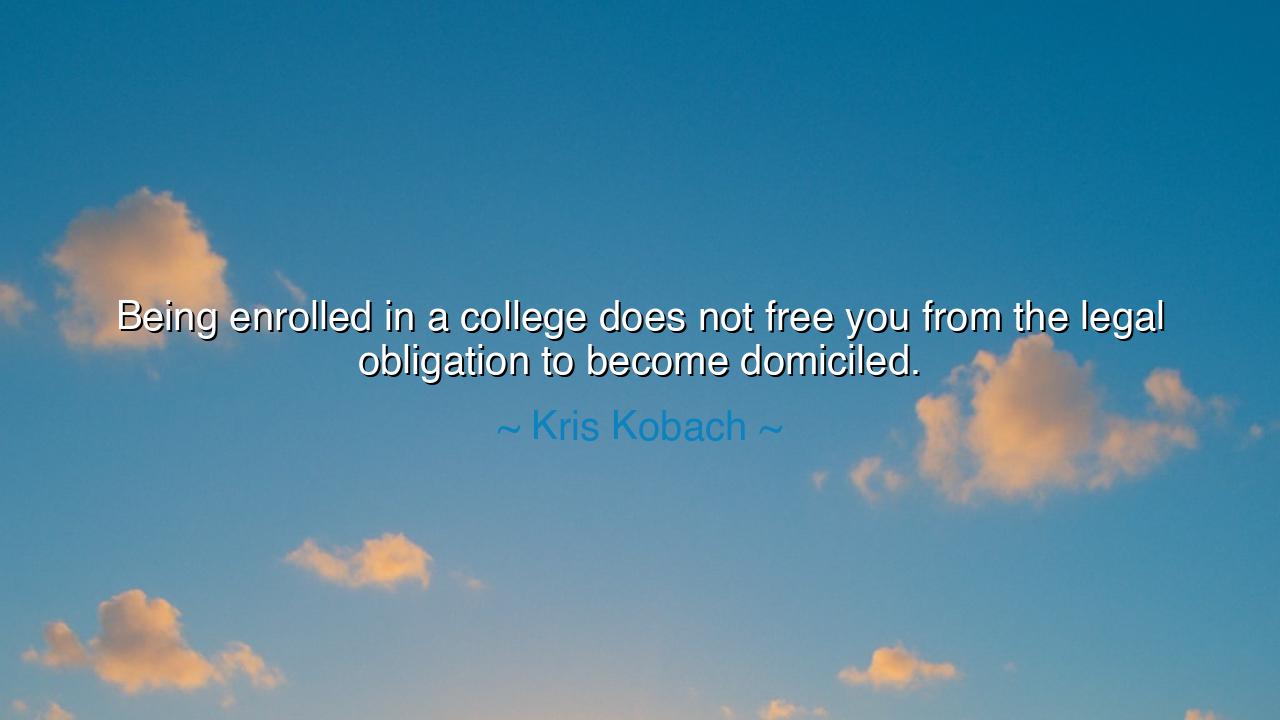
Being enrolled in a college does not free you from the legal
Being enrolled in a college does not free you from the legal obligation to become domiciled.






When Kris Kobach declared, “Being enrolled in a college does not free you from the legal obligation to become domiciled,” he spoke with the authority of a man rooted in law, yet his words reach far beyond the statutes of state. Beneath their legal precision lies a deeper truth about responsibility, belonging, and identity. His statement, though anchored in the realm of civic duty, echoes with a timeless lesson: that freedom is not an escape from obligation, but a commitment to one’s place in the world. To be “domiciled” is not merely to reside somewhere — it is to declare allegiance, to plant roots in soil both literal and moral, and to accept the burdens that come with belonging.
In the style of the ancients, one might say that Kobach spoke as a custodian of order in an age that often confuses mobility with liberty. For the youth who wander through universities, chasing knowledge and opportunity, there can arise the illusion that study alone lifts one above the ordinary ties of law and community. Yet Kobach’s words remind us that even the scholar must abide by the structure that holds civilization together. The student may dwell in thought, but he must also dwell in place. Just as the philosopher in Athens could not escape the duties of citizenship, so too must every individual recognize that to live within a society is to share its legal and moral responsibilities.
The origin of this quote lies in Kobach’s work as a lawyer and policymaker, where questions of residence, citizenship, and legal status often collide. The principle he invokes is one of domicile — a cornerstone of law that determines where a person is truly “at home” in the eyes of the state. To be domiciled is to accept both the privileges and the burdens of that home: taxes, voting, jurisdiction, and duty. In reminding college students that enrollment does not exempt them from this obligation, Kobach calls attention to a universal truth: that education may elevate the mind, but it does not dissolve the obligations of the soul. Knowledge without accountability is like wind without direction — forceful, yet rootless.
History offers countless mirrors to this principle. Consider the example of Socrates, who, though accused unjustly, refused to flee Athens when sentenced to death. He could have escaped and lived in exile, but he chose to remain, bound by his understanding of civic duty and belonging. “I am a citizen of Athens,” he declared, “and I owe my obedience to her laws.” His choice to drink the hemlock rather than abandon his home stands as one of history’s greatest acts of moral domicile. Like Kobach’s teaching, it affirms that one cannot enjoy the fruits of a society while denying its roots. True freedom, paradoxically, is found in honoring one’s obligations, not fleeing from them.
Kobach’s words also carry a more subtle wisdom for the modern age — one that speaks to the spiritual restlessness of those who seek identity without anchor. In an era when people move freely across borders, universities, and digital realms, many forget the power of place, of being known by one’s community and laws. The ancients taught that the polis — the city-state — was the womb of civilization, and that a man without a polis was not free, but lost. So too, in today’s world, the call to become “domiciled” reminds us that life gains meaning through participation, through accepting the duties that bind us to others. One who drifts through life without commitment, be it to home, faith, or law, may seem liberated — yet he lives as a stranger everywhere.
The lesson of Kobach’s words, then, extends beyond legality into the realm of character. To be “domiciled” is not only to reside within a jurisdiction, but to take ownership of one’s place in society — to live as a citizen, not merely an inhabitant. It is a call to embrace the responsibilities that come with freedom: to vote, to serve, to obey the laws that protect others as they protect you. It is a reminder that education and privilege do not absolve one from the common duties of mankind; they only deepen them. The scholar, the laborer, the ruler — all must answer to the same laws if justice is to stand firm.
So let this teaching be passed down to future generations: freedom and duty are twins, born of the same noble spirit. The one cannot live without the other. Do not seek to escape the bonds of obligation in the name of liberty, for in doing so you sever yourself from the very world that gives your life meaning. Instead, plant your roots in the soil of duty; become domiciled not only in law, but in purpose. For those who stand anchored in their responsibilities are never adrift — they are the pillars upon which civilization endures.






AAdministratorAdministrator
Welcome, honored guests. Please leave a comment, we will respond soon